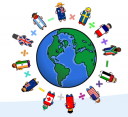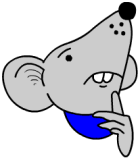Help Ted colour his white balloons. Just by clicking in the balloons the colour will change.
One click will make a balloon go Red.
Two clicks will turn the balloon Blue.
Three clicks will change the colour to Gold.
Don’t forget to press Go when you think the colours are correct!
This is great practice at counting, why not have a go?
[flash http://mathsblog.co.uk/wp-content/uploads/2008/02/colour8balloons1.swf]

 A very simple piece of maths with this maths worksheet but it can be quite powerful. Take the numbers from 1 to 9 and see how many different ways that ten can be made by adding them.
A very simple piece of maths with this maths worksheet but it can be quite powerful. Take the numbers from 1 to 9 and see how many different ways that ten can be made by adding them. This free maths worksheet continues the investigative approach to mathematics begun in year one. It is concerned with children using their knowledge to solve problems and puzzles, find patterns, make generalisations and begin to predict.
This free maths worksheet continues the investigative approach to mathematics begun in year one. It is concerned with children using their knowledge to solve problems and puzzles, find patterns, make generalisations and begin to predict.  This maths worksheet is an introduction to the investigative approach to mathematics. It is concerned with children using their knowledge to solve problems and puzzles, find patterns, make generalisations and begin to predict.
This maths worksheet is an introduction to the investigative approach to mathematics. It is concerned with children using their knowledge to solve problems and puzzles, find patterns, make generalisations and begin to predict.